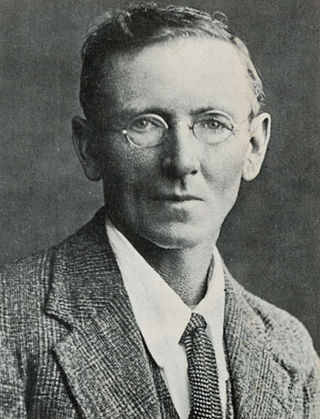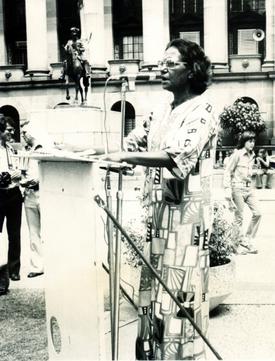Related Research Articles

The Indigenous languages of Australia number in the hundreds, the precise number being quite uncertain, although there is a range of estimates from a minimum of around 250 up to possibly 363. The Indigenous languages of Australia comprise numerous language families and isolates, perhaps as many as 13, spoken by the Indigenous peoples of mainland Australia and a few nearby islands. The relationships between the language families are not clear at present although there are proposals to link some into larger groupings. Despite this uncertainty, the Indigenous Australian languages are collectively covered by the technical term "Australian languages", or the "Australian family".

The Noongar are Aboriginal Australian peoples who live in the south-west corner of Western Australia, from Geraldton on the west coast to Esperance on the south coast. There are 14 different groups in the Noongar cultural bloc: Amangu, Ballardong, Yued, Kaneang, Koreng, Mineng, Njakinjaki, Njunga, Pibelmen, Pindjarup, Wadandi, Whadjuk, Wiilman and Wudjari. The Noongar people refer to their land as Noongar boodja.
Helen Dale is an Australian writer and lawyer. She is best known for writing The Hand that Signed the Paper, a novel about a Ukrainian family who collaborated with the Nazis in The Holocaust, under the pseudonym Helen Demidenko.

Yagan was an Aboriginal Australian warrior from the Noongar people. Yagan was pursued by the local authorities after he killed Erin Entwhistle, a servant of farmer Archibald Butler. It was an act of retaliation after Thomas Smedley, another of Butler's servants, shot at a group of Noongar people stealing potatoes and fowls, killing one of them. The government offered a bounty for Yagan's capture, dead or alive, and a young settler, William Keats, shot and killed him. He is considered a legendary figure by the Noongar.
Julian Randolph Stow was an Australian-born writer, novelist and poet.

John Shaw Neilson was an Australian poet. Slightly built, for most of his life he worked as a labourer, fruit-picking, clearing scrub, navvying and working in quarries, and, after 1928, working as a messenger with the Country Roads Board in Melbourne. Largely untrained and only basically educated, Neilson became known as one of Australia's finest lyric poets, who wrote a great deal about the natural world, and the beauty in it.

Oodgeroo Noonuccal ( UUD-gə-roo NOO-nə-kəl; born Kathleen Jean Mary Ruska, later Kath Walker was an Aboriginal Australian political activist, artist and educator, who campaigned for Aboriginal rights. Noonuccal was best known for her poetry, and was the first Aboriginal Australian to publish a book of verse.
Francis Charles Webb-Wagg was an Australian poet who published under the name Francis Webb. Diagnosed as suffering from schizophrenia in the 1950s, he spent most of his adult life in and out of psychiatric hospitals. His output was prolific and his work has often been published in anthologies.

John Ernest Tranter was an Australian poet, publisher and editor. He published more than twenty books of poetry; devising, with Jan Garrett, the long running ABC radio program Books and Writing; and founding in 1997 the internet quarterly literary magazine Jacket which he published and edited until 2010, when he gave it to the University of Pennsylvania.

Kim Scott is an Australian novelist of Aboriginal Australian ancestry. He is a descendant of the Noongar people of Western Australia.
Kenneth Desmond Colbung AM MBE, also known by his indigenous name Nundjan Djiridjarkan, was an Aboriginal Australian leader from the Noongar people who became prominent in the 1960s. He was appointed an MBE and an AM for his service to the Aboriginal community.

Whadjuk, alternatively Witjari, are Noongar people of the Western Australian region of the Perth bioregion of the Swan Coastal Plain.
Noongar is an Australian Aboriginal language or dialect continuum, spoken by some members of the Noongar community and others. It is taught actively in Australia, including at schools, universities and through public broadcasting. The country of the Noongar people is the southwest corner of Western Australia. Within that region, many Noongar words have been adopted into English, particularly names of plants and animals.

William Saville-Kent was an English marine biologist and author.
Colin Thomas Johnson, better known by his nom de plume Mudrooroo, was a novelist, poet, essayist and playwright. He has been described as one of the most enigmatic literary figures of Australia and his many works are centred on Australian Aboriginal characters and Aboriginal topics.

The Australian frontier wars were the violent conflicts between Indigenous Australians and non-Indigenous settlers during the colonisation of Australia. The first conflict took place several months after the landing of the First Fleet in January 1788, and the last frontier conflicts occurred in the early 20th century, with some occurring as late as 1934. An estimated minimum of 100,000 Indigenous Australians and between 2,000 and 2,500 settlers died in the conflicts. Conflicts occurred in a number of locations across Australia.
Mithaka is an extinct Australian Aboriginal language in the Barcoo Shire of Western Queensland spoken by the Mitaka people.
Pirriya is an extinct and unclassified Australian Aboriginal language. It was spoken by the Bidia people of the western and central western Queensland, including Barcoo Shire, Whitula Creek, Cooper Creek, and Jundah.
Angela Ryder is a Wilman Noongar from Western Australia who is a co-founder of the Langford Aboriginal Association and the Senior Manager of Aboriginal Services with Relationships Australia.
Glenys Collard is a Noongar educator and writer. She was born in 1958 at Kondinin and is a member of the Stolen Generation. She is the daughter of Donald and Sylvia Collard who had nine children removed and sent to Sister Kate's when they were living in Brookton between 1958 and 1961. At the age of two she was removed from her family and placed in Sister Kate's Children's Home, Perth. Her parents sued the State of Western Australia over the poor treatment of their children while they were at Sister Kate's. This case was lost in 2013.
References
- ↑ Robyn McCarron (16 April 2015). "Noongar Language and Literature". Murdoch University . Retrieved 1 May 2016.
- ↑ "Author - Graeme Dixon". University of Queensland. 2007. Retrieved 21 December 2016.
- ↑ "Holocaust Island Author: Graeme Dixon". University of Queensland Press. 2007. Retrieved 1 May 2016.
- ↑ "Graeme Dixon i(72 works by) (a.k.a. Graeme 'Bindarri' Dixon)". Austlit. Retrieved 1 May 2016.
- ↑ "Holocaust revisited : killing time / Graeme Dixon". National Library of Australia. 2003. Retrieved 1 May 2016.